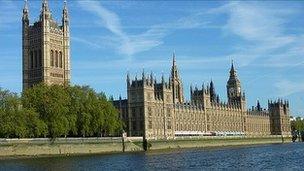Rogue lobbyists 'could face jail' under register plans
- Published

David Cameron has called lobbying "the next big scandal waiting to happen" at Westminster
Companies or individuals who breach new rules on Parliamentary lobbying could face up to two years in prison, under government proposals.
All lobbyists, including trade unions and charities, would also have to sign a statutory register.
Launching a consultation on the plans, minister Mark Harper said lobbying itself was "perfectly proper" but it must happen "out in the open".
Labour said any new system must include a detailed code of conduct.
Action on lobbying was promised in the coalition agreement to deal with what David Cameron has called "the next big scandal waiting to happen" at Westminster.
Definition and funding
Calls for a statutory register intensified in December after undercover reporters taped executives from public affairs company Bell Pottinger boasting of their power to influence the prime minister.
And in 2010, three former Labour ministers were stripped of parliamentary passes after they breached lobbying rules.
The 12-week consultation, external will consider a number of factors, including the definition of lobbying and lobbyists, and exactly who should register.
The government proposes that anyone who seeks to influence government policy "on behalf of a third party" should be covered - and asks whether that should extend to trade unions, charities and think tanks.
The consultation will also consider how the register should be funded, with ministers suggesting money could come from lobbying companies and individuals themselves, in the form of an annual subscription.
The government says it hopes the industry "will embrace steps to make it more transparent, making the process largely self-regulating" but penalties could be enforced for "non-compliance".
These could include fines of up to £5,000 for missing deadlines, or a jail term for knowingly making misleading statements.
'Serious flaws'
It also says the register should be managed and enforced by an independent body "in order to build and maintain public trust".
Mr Harper, minister for political and constitutional reform, said lobbying had "an important role in the policy making process, ensuring that ministers and senior officials hear a full range of views from those who will be affected by government decisions".
"But it must be conducted in a transparent and open way," he said.
"We already publish an unprecedented amount of information about who ministers and senior officials meet.
"However, it's not always possible to understand the significance of these meetings, because it's not always obvious who the people ministers and officials meet represent."
Shadow Cabinet Office minister Jon Trickett said the government "must use this opportunity to sort out once and for all the serious flaws in the current system".
"There needs to be a statutory register of lobbyists with a clear definition of what lobbying is and everyone who comes under the new definition of lobbying must register.
"There needs to be a code of conduct with clear consequences for those who breach it, with the ultimate sanction of being struck off the register in the most serious cases."
RMT union general secretary Bob Crow reacted angrily to the proposals, calling them a "blatant attack on the trade union movement".
"The idea that trade unions, representing millions of workers up and down the country, should be bracketed in with the chancers and shmoozers from the shadowy world of political lobbying is a gross insult to men and women fighting for a fair deal in the workplace," he said.
Jon McLeod, chairman of lobbying firm Weber Shandwick, said it had "long argued for statutory regulation as the best means of assuring public confidence in the public affairs industry".
- Published6 December 2011
- Published17 October 2011